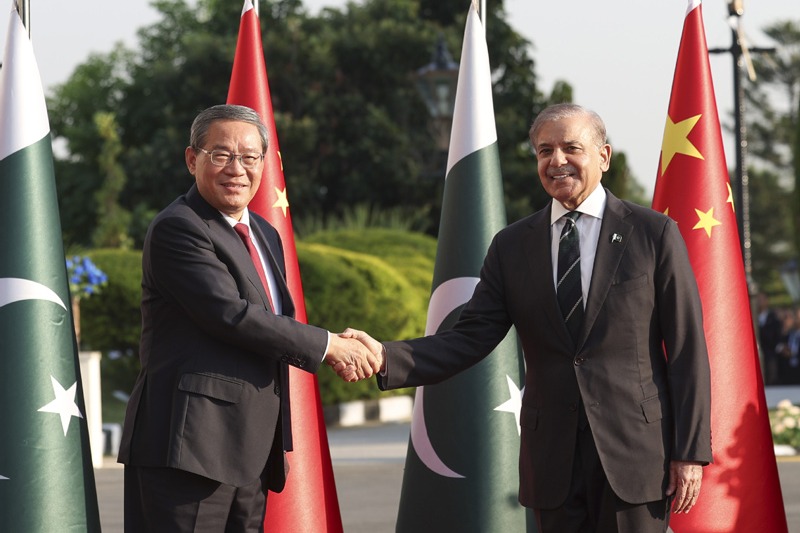Ethnic music show a ratings and online hit

A live TV show featuring musical performances that showcase ethnic elements from home and abroad has won over fans and ignited young viewers' interest in diverse ethnic musical cultures and instruments.
In the first episode of Music in Joy, which was broadcast on Friday, six pairs of Chinese singers and two sets of international singers gave performances featuring different ethnic groups in China and music from Brazil and Russia. All the songs were original compositions, and audience members were impressed by the singers' skill and the diversity of the performers.
The performances included ethnic minority groups, musical instruments and clothing from the Xinjiang Uygur and Xizang autonomous regions, as well as Yunnan province. Chinese singer Yang Ge and Russian singer Mariya Poezzhaeva sang a duet in Russian.
Brazilian singer Alexia Evellyn won over the Chinese audience with a song called Hold on, featuring the freedom and wild beauty of the South American country.
The first of three episodes of the show premiered on Hunan Satellite TV and Mango TV on Friday. Hunan Satellite TV said it ranked No 1 among all shows aired by provincial TV stations during the same time slot, and also garnered 880 million views on social media platforms on Friday.
With this year marking the 50th anniversary of the establishment of diplomatic ties between China and Brazil, the Foreign Ministry's Latin American and Caribbean Department endorsed Evellyn's performance on its Sina Weibo micro-blog account.
Evellyn said she experienced the local folk ethnic culture during a recent trip to Zhangjiajie, Hunan province, and enjoyed the beautiful scenery, culture and food there.
She said she was happy to be on stage and share music with such talented musicians, and she wanted to express courage and confidence through her music.
Veteran vocalist Gong Linna gave a performance in the Chaoshan dialect of Guangdong province, expressing the feelings of people missing their hometowns.
Young people have become fans of traditional Chinese music and culture, which has raised the profile of ethnic music, a genre that reminds people of their roots, she said.
Gong said she has been to many regions inhabited by ethnic minority groups and learned from local people's singing techniques and styles, which has inspired her artistic innovation and confidence.
She encouraged more musicians to visit different places in China and hear how local people sing, live and fall in love, saying the experience could inspire their music and lengthen their musical careers.
"When we talk about foreign music, we often only talk about music from the United States or Europe," she said. "In fact, there are important musical genres from India, Russia, Central Asia and Latin America. The communication of different music from China and abroad can forge friendships."
Singer Ayanga, a member of the Mongolian ethnic group, gave a performance in both Mandarin and Mongolian and performed a Mongolian dance during the interlude.
He said there are talented musicians and inspiring pieces of music that have been passed down for thousands of years in China and will be inherited for thousands of years to come.
"The music forms our roots, and we have such a treasure, so that we need to perform it to a young and broader audience," he said.
Huang Xiaoying, 23, a postgraduate student from Wuhan, Hubei province, watched the live performance at the studio. She said that although the singers came from different ethnic groups and cultures, they all reflected on similar topics in their songs — contemplating the world, nature and humanity.
"Ethnic music is not only a representation of a specific ethnic group but also of the world," Huang said. It belongs to different nations and cultures, yet it can transcend national and cultural boundaries, she said.
Zhao Xincheng, 21, was also in the live audience at Friday's show. He said he was most impressed by the performances of Evellyn and Yunggiema, a member of the Monba ethnic group from Xizang.
While they sang in different languages, they shared similar themes in their music, which called on people to love each other and embrace world peace, he said.
"Ethnic music just has the power to surmount language barriers and touch people's hearts," Zhao said.
zoushuo@chinadaily.com.cn
?
- Media outlets urged to promote integration
- Chinese defense ministry slams US arms sales to Taiwan region
- Photo show helps Japanese see real Xinjiang
- Beijing court sees more copyright disputes settled
- Agriculture IP protection to stimulate industrial innovation
- Sun Yat-sen University Institute to boost East-West exchanges





































